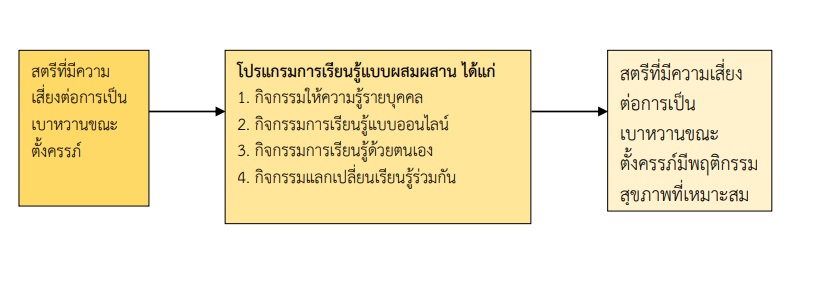ผลของโปรแกรมการเรียนรู้แบบผสมผสานต่อพฤติกรรมสุขภาพ ในสตรีที่มีความเสี่ยงต่อการเป็นเบาหวานขณะตั้งครรภ์
คำสำคัญ:
โปรแกรมการเรียนรู้แบบผสมผสาน, พฤติกรรมสุขภาพ, สตรีที่มีความเสี่ยงต่อการเป็นเบาหวานขณะตั้งครรภ์บทคัดย่อ
การวิจัยแบบทดลองสุ่มกลุ่มตัวอย่างไม่สมบูรณ์ แบบ 2 กลุ่ม วัดก่อนและหลังการทดลอง มีวัตถุประสงค์เพื่อศึกษาผลของโปรแกรมการเรียนรู้แบบผสมผสานต่อพฤติกรรมสุขภาพในสตรีที่มีความเสี่ยงต่อการเป็นเบาหวานขณะตั้งครรภ์ระหว่างกลุ่มได้รับโปรแกรมการเรียนรู้แบบผสมผสานและกลุ่มไม่ได้รับโปรแกรมการเรียนรู้แบบผสมผสาน กลุ่มตัวอย่างคือ สตรีที่มีความเสี่ยงต่อการเป็นเบาหวานขณะตั้งครรภ์มีอายุครรภ์อยู่ในช่วง 20-24 สัปดาห์ ที่มารับบริการฝากครรภ์ที่โรงพยาบาลศูนย์อุดรธานี จังหวัดอุดรธานี ระหว่างเดือนสิงหาคม ถึง เดือนพฤศจิกายน พ.ศ. 2563 จำนวน 52 ราย เข้ากลุ่มทดลองและกลุ่มควบคุม จำนวนกลุ่มละ 26 ราย กลุ่มทดลองได้รับโปรแกรมการเรียนรู้แบบผสมผสานร่วมกับคำแนะนำตามปกติ และกลุ่มควบคุมได้รับคำแนะนำตามปกติ เครื่องมือที่ใช้ในการดำเนินการวิจัย ได้แก่ 1) โปรแกรมการเรียนรู้แบบผสมผสาน และ 2) คู่มือการดูแลตนเองสำหรับสตรีที่มีความเสี่ยงต่อการเป็นเบาหวานขณะตั้งครรภ์ เครื่องมือที่ใช้ในการเก็บรวบรวมข้อมูล ได้แก่ 1) แบบบันทึกข้อมูลส่วนบุคคล และ 2) แบบสอบถามพฤติกรรมสุขภาพของสตรีที่มีความเสี่ยงต่อการเป็นเบาหวานขณะตั้งครรภ์ที่ผู้วิจัยสร้างขึ้น ได้ผ่านการพิจารณาความตรงเชิงเนื้อหา มีค่าคะแนนเท่ากับ 1 และมีความเชื่อมั่นเท่ากับ .87 วิเคราะห์ข้อมูลโดยใช้สถิติพรรณนา สถิติทดสอบของฟิชเชอร์เอ็กแซค สถิติทดสอบสองกลุ่มที่เป็นอิสระต่อกัน และสถิติทดสอบสองกลุ่มที่ไม่เป็นอิสระต่อกัน ผลการวิจัยพบว่า
1. กลุ่มทดลองหลังได้รับโปรแกรมการเรียนรู้แบบผสมผสานมีค่าเฉลี่ยคะแนนพฤติกรรมสุขภาพมากกว่าก่อนได้รับโปรแกรมเรียนรู้แบบผสมผสานอย่างมีนัยสำคัญทางสถิติ (p<.001)
2. กลุ่มทดลองหลังได้รับโปรแกรมการเรียนรู้แบบผสมผสานมีค่าเฉลี่ยคะแนนพฤติกรรมสุขภาพมากกว่ากลุ่มควบคุมอย่างมีนัยสำคัญทางสถิติ (p<.001)
ผลการวิจัยครั้งนี้เสนอแนะว่า พยาบาลผดุงครรภ์สามารถนำโปรแกรมการเรียนรู้แบบผสมผสาน ไปใช้ในการให้การพยาบาลเพื่อส่งเสริมพฤติกรรมสุขภาพในสตรีที่มีความเสี่ยงต่อการเป็นเบาหวานขณะตั้งครรภ์ได้
เอกสารอ้างอิง
American College of Obstetricians and Gynecologists. (2018). ACOG Practice Bulletin No. 190: Gestational Diabetes Mellitus. Obstetrics & Gynecology, 131(2), e49–e64. doi:10.1097/aog.0000000000002501
Chuchue, A., Pakdevon, N., & Binhosen, V. (2014). Effects of Self Management Enhancing Program on Health Behaviors and Blood Sugar in Women with Gestational Diabetes Mellitus. Journal of Nursing and Health Care, 32(4), 60-67.
Bellamy, L., Casas, J. P., Hingorani, A. D., & Williams, D. (2009). Type 2 Diabetes Mellitus After Gestational Diabetes: A Systematic Review and Meta-Analysis. The Lancet, 373(9677), 1773–1779.
Burn, N., & Grove, S. K. (2009). The Practice of Nursing Research: Conduct, Critique and Utilization (6thed.). St. Louis: Elsevier Saunders.
Bunthalarath, S., Sunsaneevithayakul, P., & Boriboohirunsarn, D. (2004). Risk Factors for Early Diagnosis of Gestational Diabetes Mellitus. Journal-Medical Association of Thailand, 87, S50–S53.
Carolan-Olah, M., Steele, C., & Krenzin, G. (2015). Development and Initial Testing of a GDM Information Website for Multi-Ethnic Women with GDM. BMC Pregnancy and Childbirth, 15(145). 1-9. doi.org/10.1186/s12884-015-0578-0
HAPO Study Cooperative Research Group. (2002). The hyperglycemia and Adverse Pregnancy Outcome (HAPO) Study. International Journal of Gynecology & Obstetrics, 78(1), 69-77.
HAPO Study Cooperative Research Group. (2008). Hyperglycemia and Adverse Pregnancy Outcomes. New England Journal of Medicine, 358(19), 1991-2002.
International Diabetes Federation [IDF]. (2017). Care & Prevention Gestational Diabetes. Retrieved form https://www.idf.org/our-activities/care-prevention/gdm.html
Kamana, K. C., Shakya, S., & Zhang, H. (2015). Gestational Diabetes Mellitus and Macrosomia: a Literature Review. Annals of Nutrition and Metabolism, 66(Suppl. 2), 14-20.
Kasl, S. V., & Cobb, S. (1966). Health Behavior, Illness Behavior, and Sick-Role Behavior. Archives of Environmental Health: An International Journal, 12(4), 531-541. doi:10.1080/00039896.1966.10664421
Kramer, C. K., Campbell, S., & Retnakaran, R. (2019). Gestational Diabetes and the Risk of Cardiovascular Disease in Women: a Systematic Review and Meta-Analysis. Diabetologia, 62(6), 905-914.
Limruangrong, P., Boriboonhirunsarn, D., Puangsricharern, A. & Pinitlertsakun, O. (2016). Factors Influencing the Occurrence of Gestational Diabetes Mellitus in Pregnant Women with Abnormal Glucose Challenge test. Journal of Nursing Science, 34(2), 59-69.
Qui, J., Liu, Y., Zhu, W., & Zhang, C. (2020). Comparison of Effectiveness of Routine Antenatal Care with a Midwife-Managed Clinic Service in Prevention of Gestational Diabetes Mellitus in Early Pregnancy at a Hospital in China. Medical Science Monitor: International Medical Journal of Experimental and Clinical Research, 26, e925991-18. doi: 10.12659/MSM.925991
Pholyiam, R. & Wattananukulkiat, S. (2016). Effect of Health Belief Based Education Program on Health Behavior among Pregnant Women at Risk for Gestational Diabetes Mellitus. The Journal of Baromarajonani College of Nursing Nakhonratchasima, 22(1), 77-92.
Rojnawaseree, D. (2018). The Effect of Health Promotion and Spouse Support to the Blood Glucose Level and Health-Promoting Behaviors in Women at Risk of Gestational Diabetes Mellitus. Nursing Public Health and Education Journal, 19(3), 47-58.
Singwongsa, A., & Borriboonhiransan, D. (2016). Incidence and Associated Factors of Gestational Diabetes Mellitus Diagnosed During 24-28 Weeks of Gestation. Thai Journal of Obstetrics and Gynaecology, 24(3), 184-192.
Sitkulanan, P. & Kumtip, P. (2020). Impact of a Self-Management Programme Monitored Through the Application LINE on Eating Behaviour, Arm-Swing Exercise Behaviour, and Blood Glucose Levels in Women with Gestational Diabetes Mellitus. Journal of Thailand Nursing and Midwifery Council, 35(2), 52-69.
Society of Obstetricians and Gynaecologists of Canada. (2016). Diabetes in Pregnancy. J Obstet Gynaecol Can, 38(7), 67-79.
Uwes, A. C., Wibawa, B., & Syahrial, Z. (2018). Determining the Appropriate Blend of Blended Learning: A Formative Research in the Context of Spada-Indonesia. American Journal of Educational Research, 6(3), 188-195. doi:10.12691/education-6-3-5
Wang, C., Wei, Y., Zhang, X., Zhang, Y., Xu, Q., Sun, Y., et al. (2017). A Randomized Clinical Trial of Exercise During Pregnancy to Prevent Gestational Diabetes Mellitus and Improve Pregnancy Outcome in Overweight and Obese Pregnant Women. American Journal of Obstetrics and Gynecology, 216(4), 340-351. doi:10.1016/j.ajog.2017.01.037
Zhu, Y., & Zhang, C. (2016). Prevalence of Gestational Diabetes and Risk of Progression to Type 2 Diabetes: a Global Perspective. Current Diabetes Reports, 16(7). doi:10.1007/s11892-015-0699-x

ดาวน์โหลด
เผยแพร่แล้ว
ฉบับ
ประเภทบทความ
สัญญาอนุญาต
ลิขสิทธิ์ (c) 2022 วารสารเครือข่ายวิทยาลัยพยาบาลและการสาธารณสุขภาคใต้

อนุญาตภายใต้เงื่อนไข Creative Commons Attribution-NonCommercial-NoDerivatives 4.0 International License.
1. บทความหรือข้อคิดเห็นใด ๆ ที่ปรากฏในวารสารเครือข่าย วิทยาลัยพยาบาลและการสาธารณสุขภาคใต้ ที่เป็นวรรณกรรมของผู้เขียน บรรณาธิการหรือเครือข่ายวิทยาลัยพยาบาลและวิทยาลัยการสาธารณสุขภาคใต้ ไม่จำเป็นต้องเห็นด้วย
2. บทความที่ได้รับการตีพิมพ์ถือเป็นลิขสิทธิ์ของ วารสารเครือข่ายวิทยาลัยพยาบาลและการสาธารณสุขภาคใต้







